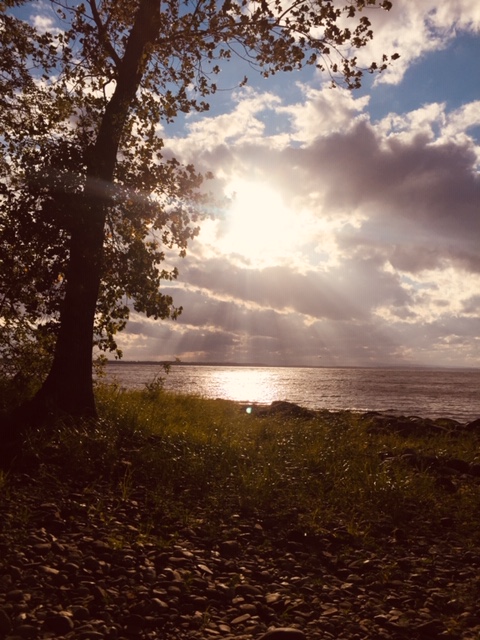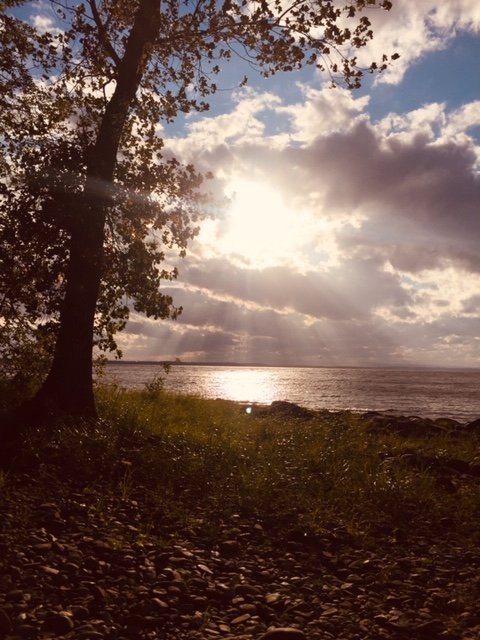I don’t just preach happiness. I practice it with a variety of tools: exercise, meditation several days a week, spending time in nature, and a nightly gratitude journal including a quick description of the “Best Moment of the Day.” This last practice I picked up after watching one of my positive psychology teachers, Maria Sirois, describe it in an interview with Action for Happiness. It is an uplifting exercise, no matter the day.

Because happiness is like a “use it or lose it” muscle, I track all of the above along with creativity, learning, and taking the time to be with friends on a daily chart. But for several weeks in September, I stopped any formal version of my happiness practices. The chart stayed blank.
At first, I stopped measuring specific, defined happiness practices because that felt gratuitous while we were on vacation, camping in Burton Island State Park, where many campsites have their own private beaches on Lake Champlain. I didn’t need a journal to feel gratitude; I could just look around. But, while we were there, the sadnesses began to arrive.
First was an email on Wednesday from my oldest sister letting my other siblings and me know that our youngest sister Marybeth had only a few more days to live. This was not a surprise. Marybeth went on hospice in mid-July, thanks to a devastatingly aggressive case of Parkinsons Disease. Despite Covid-19, I had driven to Pennsylvania to be with her one more time, and say goodbye.
Now, while camping, there was nothing left to do. We couldn’t even get off the island for a couple of days, since the state park ferry wasn’t in service again till Friday. So I tried to put the sad news aside and continue relaxing amid the simple pleasures of hiking and campfires.
I didn’t sleep well, and I wasn’t super cheery, but I did okay until Saturday morning. My husband Bob kindly let me drink my coffee before telling me the next sad news, which he had learned a few hours earlier: Ruth Bader Ginsberg was dead. I started crying almost immediately — not little drops sliding down my cheeks but loud, gulping sobs. RBG’s death at an advanced age was not personally tragic, but I believed that her death was also a death knell for the Supreme Court, and many of the fundamental human rights that Court has historically protected. I have revered the Supreme Court since my early teens. Thurgood Marshall! William O. Douglas! Brown v. The Board of Education! Roe v. Wade! Now, I feared the Supreme Court might be irrevocably broken. Nothing left for me to revere.
So I sobbed, for the Court, for our country, for imperiled democracy, for the people likely to suffer the loss of protection. The sobs likely also unleashed months of pandemic and political anxiety. As well, I was undoubtedly crying for my sister.
This time, there was a) a ferry available and b) no way of pretending I was okay. Plus, the campground had filled up for the weekend, and I imagine none of our neighbors enjoyed hearing me bawling. It was time to go home. We decided to pack up as fast as possible, and get a late morning ferry to the mainland.
At some point, during repeated trips between our campsite and the ferry — we believe in comfortable camping, and had a lot of stuff — Bob got an urgent call from our daughter Jennifer. Once again, Bob waited till a reasonable moment to tell me her bad news.
That moment came as the ferry pulled away. We were the only passengers on the lower level. Bob told me, our son Ben had been worried about our family friend Chris, who rented the A-frame adjacent to our house. It had been a few days since Ben saw Chris, his buddy for decades, since high school. Ben went to the A-frame and found that Chris was dead.
I screamed, I just screamed right out loud in shock and disbelief. Chris, just 47 years old, a big bold character brimming with life and plans was dead? And my poor son had discovered his friend’s body? And our daughter had to call the police? The police were coming to my house to take away a dead body?
There was no way I could process this news. But I was somehow still able to make an important “happiness” choice when the ferry landed. Thanks in part to the pandemic, our two adult children and one grandchild are all living semi-autonomously on separate floors in our house built within an old dairy barn. Sometimes we’re together, sometimes apart. Coping with the shock of Chris’s death, my children would surely want us to be together. But it would at least a hour and a half to drive home from the Burton Island parking lot. So I reached out to friends. I sent a frantic email to several BFFs with a quick explanation of what had happened. Please, I asked them, can you go keep my kids company till we get home?
The drive home was rough, especially since we had packed so much camping stuff we had driven two cars to hold it all. Now, we were each alone, speeding down the interstate in a state of turmoil. In my car, among so many other thoughts swirling in my brain, I told myself, pay attention. Be safe. Take your time. But I also thought, what now, happiness lady? How does a “happiness expert” approach a situation like this?
The answer, of course, was to be sad. I knew I was in shock. I knew this was a terrible event for my whole family.
I also knew, at some point, the trauma and grief would end. I’m resilient. Five years ago, another dear friend died suddenly — murdered by her husband who then committed suicide — and after a certain amount of grieving and healing, I bounced back to my normal happy self. (To be clear, and fair to his memory, Chris’s death was not violent or suicidal, just shockingly unexpected.) Knowing that I would eventually be happy again gave me the freedom to lean into the grief and trauma — mine, and everyone else’s in the household.
At the same time, because I regularly train my brain to focus on gratitude, I remained acutely aware of the good which surrounded us. For example, my friends did show up for my children, who deeply appreciated the support. Indeed, both my daughter and son may well remember the moment those friends showed up for the rest of their lives. For each of them it was a moment of love and kindness in the midst of chaos — demonstrating yet again one more way relationships are fundamentally important to human happiness.
As a family, we also experienced deep love and bonding with one another. and very special times with each other. I presume no one is eager for our times of grief, but connections with loved ones in grieving times is definitely a silver lining — giving and receiving kindness, cultivating and reaping the rewards of strong relationships. I may never forget how and when I learned of Chris’s death, but neither will I forget how we supported each other.
So there we were, quietly putting one foot in front of the other. I was very tired. I had plenty to do but I didn’t push myself.
And then, just a little more than a week later, my sister Marybeth died.
It was a lot to cope with. I’m not even sure I had the emotional space to grieve for my sister — that space was still pretty full. But I am sure that relationships once again came to the rescue.
I have found that my emotions can be quite complicated when someone close to me dies. In what may be a defense mechanism to buy me time and let the grief seep in slowly, I tend to get angry at the deceased rather than remember all the good parts. Fortunately, two of my dearest friends are psychotherapists. Each of them gave me the gift of a long walk when I could say whatever I needed or wanted to. I cried, I raged, I laughed, and eventually I felt better, calmer, sad but peaceful.
And again I found comfort in familial love — my siblings and nieces and nephews this time. As we planned the memorial service (mostly a zoom affair), and together laughed about Marybeth’s well-lived life, our bonds were also strengthened. We have a shared history. We’re still alive.
Since then, I have had many days of being tired and feeling a little bleak and blue. I have wondered, is it grief? Is it pandemic and/or political anxiety and exhaustion? Is it the normal progression of the seasons, as the darkness arrives earlier and earlier? Is it all of the above? In response, I have tried to work when I had the energy and napped when I didn’t. I’ve been gentle with myself. I’ll be happier again. And some days, I am! Especially when the sun is shining.
In my ongoing meditation classes, I often suggest that it’s best to build our meditative skills when life is more benign, so that these tools are readily available to us when we need them the most. I think the same is true of happiness practices. It’s great to feel happy in good times, but even more helpful to tap into the knowledge and benefits of happiness practice when your life hits a rocky patch. September was rough, but it likely would have been a lot worse without my inner wells of happiness. I am grateful.


